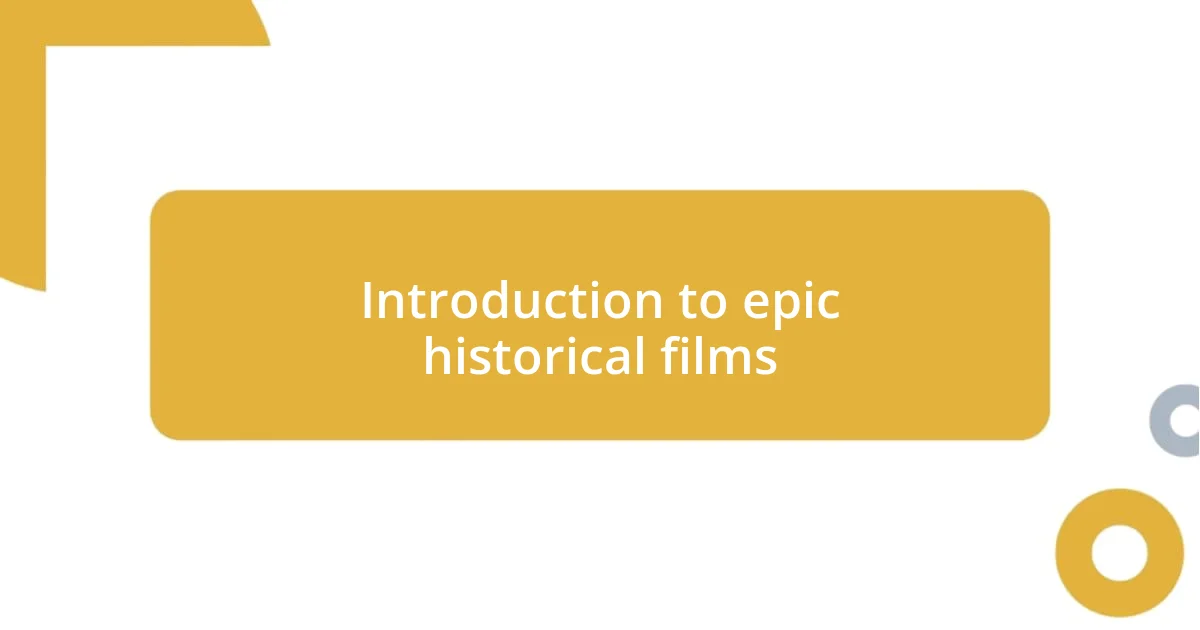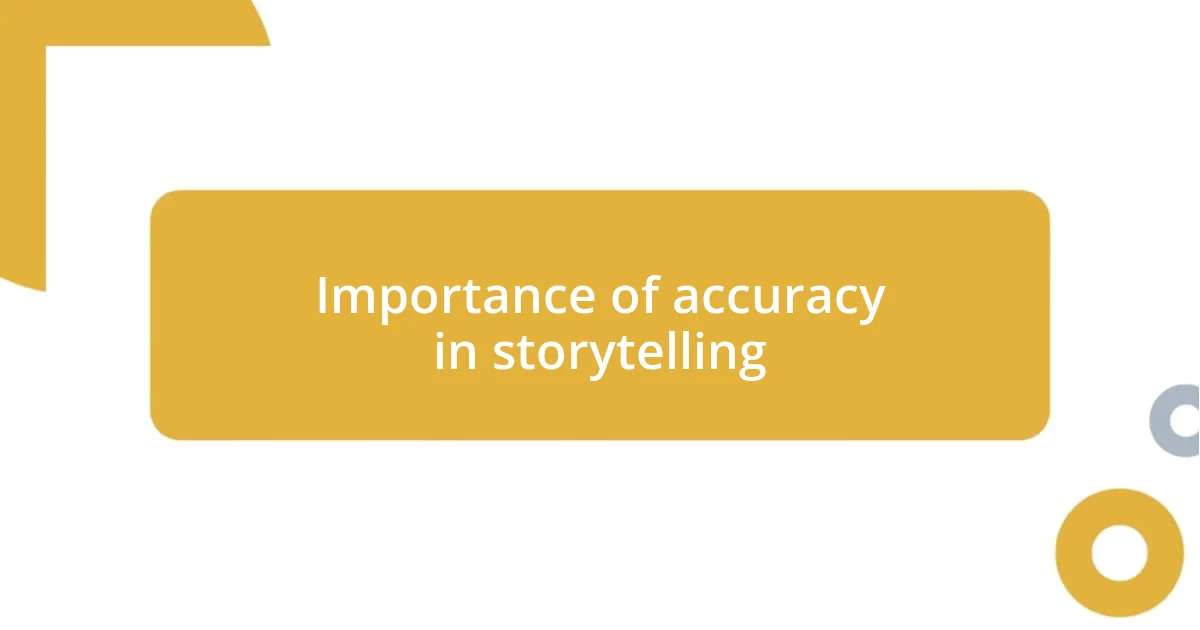Key takeaways:
- Epic historical films blend entertainment with education, inspiring viewers to delve deeper into historical contexts and events.
- Key features of captivating historical films include authentic representation, nuanced characters, stunning visuals, compelling storytelling, and timeless themes.
- Accuracy in storytelling enhances emotional impact and public perception, shaping how audiences understand historical narratives.

Introduction to epic historical films
Epic historical films have a unique power to transport us to times long past, immersing us in sweeping narratives filled with drama and passion. I still vividly remember the first time I watched “Gladiator.” The sheer scale and emotional depth left me in awe and made me wonder how history can be both a canvas for storytelling and a mirror reflecting our human experience.
What draws us to these epic tales? Is it the larger-than-life characters, the breathtaking visuals, or the timeless themes of love, honor, and betrayal? Personally, I think it’s a combination of all these elements. Reflecting on some of my favorites, such as “Braveheart” or “Saving Private Ryan,” I can feel the adrenaline rush of battle and the weight of sacrifice that each character bears. These films allow us to connect with history on a personal level, sparking a deeper curiosity about the real events that shaped our world.
At their core, epic historical films serve as both entertainment and education. They often inspire viewers to explore the intricacies of our past, leading me to dive deeper into the historical contexts behind these grand narratives. Just think, how many times have you felt compelled to read more about a specific period after watching a captivating film? That’s the beauty of these stories—they not only entertain but also cultivate a greater understanding of who we are and where we came from.

Features of captivating historical films
Captivating historical films possess certain features that elevate them beyond mere storytelling. One striking element is their ability to create a strong emotional connection with the audience. I recall watching “12 Years a Slave”—the emotional weight of Solomon Northup’s journey left me reflecting on the power of resilience and the human spirit. The authenticity of the characters and the visceral portrayal of their struggles resonate on a profound level, making history painfully real.
Here are some key features that draw us in:
- Authentic Representation: Well-researched portrayals of characters and events create a believable atmosphere.
- Nuanced Characters: Complex personalities allow viewers to relate to their triumphs and failures.
- Visually Stunning Cinematography: Breathtaking visuals bring the historical setting to life, immersing us in the time period.
- Compelling Storytelling: A strong narrative arc, filled with tension and emotional stakes, keeps viewers engaged from start to finish.
- Timeless Themes: Universal concepts like love, sacrifice, and betrayal invite reflection on our own lives.
Then there’s the powerful sound design and score that enhance the experience. Watching “Schindler’s List” for the first time, I was struck not only by the harrowing tale but also by the haunting music that lingered long after the credits rolled. It’s through these artistic decisions that historical films evoke emotions, sparking conversations about our past and its implications for the future.

Importance of accuracy in storytelling
Accuracy in storytelling is essential in historical films. I’ve found that when filmmakers prioritize historical accuracy, it deeply enriches the narrative. For instance, when I watched “Lincoln,” I was captivated not only by Daniel Day-Lewis’s stunning performance but also by the film’s commitment to the complexities of that era. The precise representation of dialogues and events left a lasting impression on me, enhancing my understanding of Lincoln’s struggles and triumphs.
Moreover, inaccuracies can lead to misinterpretations of history, even if unintentional. I remember discussing “Kingdom of Heaven” with friends afterward and feeling a mix of excitement and disappointment. While the visuals were breathtaking, the liberties taken with historical facts sparked a debate about how those choices shape our perception of the past. It’s fascinating to think about how a single film can influence so many people’s understanding of a specific event or period.
Additionally, the emotional resonance of a film often derives from its authenticity. I think about “The Pianist” and how the film’s realistic portrayal of hardship and survival moved me deeply. The accurate depiction of the time period allowed me to connect with the protagonist’s experiences on a personal level, making the story all the more impactful. It’s moments like these that remind me of the responsibility filmmakers hold when portraying history.
| Aspect | Importance |
|---|---|
| Historical Accuracy | Enhances understanding and connection to real events |
| Emotional Impact | Authenticity leads to deeper emotional engagement |
| Public Perception | Inaccuracies can reframe historical narratives |

My personal favorites and recommendations
I’m particularly drawn to “Gladiator.” The raw emotions and stunning visuals captivated me from the start. Russell Crowe’s portrayal of Maximus resonates deeply; his fight for justice and personal redemption is something I think we can all relate to. Isn’t it fascinating how a film can make us feel so connected to a character’s journey, even in a time so far removed from our own?
Another historical film I can’t recommend enough is “The Last Samurai.” The cultural clash presented in this movie made me reflect on issues of honor and tradition. I remember watching it on a chilly evening, feeling a sense of warmth as I explored the beauty of samurai culture alongside Tom Cruise’s character. It left me wondering about the sacrifices made in the name of change versus the preservation of heritage.
Lastly, I have to mention “Dunkirk.” The suspenseful storytelling and unique narrative structure left me breathless. As I sat in the theater, the feeling of being on that beach with the soldiers was incredibly immersive. It made me think about the weight of survival and the bonds formed in dire circumstances. How does a film manage to transport us like that? It’s the blend of exceptional direction and relatable human experience that really draws me in.














